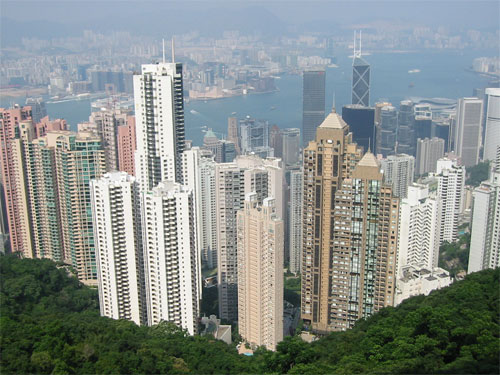Hong Kong ponders 'most livable city' title


HONG KONG -- Hong Kong was ranked the most livable city in the world, a title that has raised more than a few eyebrows among those who actually live here.
"We love our city, of course, and it should certainly top the 'most dynamic, lively, fun and awesome' index but, really, 'most liveable'?" questioned the bloggers at Time Out magazine in Hong Kong.
The Economist Intelligence Unit's bi-annual livability index has long pitted cities against each other as the best places to be. But this time around it held a competition to find more parameters to measure livability.
Filippo Lavato, an architect and urban planner from Italy, won the competition, adding to the EIU’s original survey seven new indicators: green space, lack of sprawl, natural assets, cultural assets, connectivity, lack of isolation and pollution.
By factoring these parameters in to create the so-called spatially-adjusted index, the perennial favorites for the top spot, Vancouver and Melbourne, were knocked out of the top 10.
Instead, Hong Kong came in first out of 70 cities ranked, followed by Amsterdam, Osaka, Paris and Sydney.
But for those living in Hong Kong, no title could be more contrary to public sentiment over the past months and years. While plenty of people still think Hong Kong is a great city in many ways, the notion of "livability" is something different altogether -- especially when the measurements are related to space.
It is true that the city has a lot of green space, but the parks are not placed alongside buildings but rather cover, in great swaths, hills enjoyed mostly by the occasional hiker.
"It seems [the index] is trying to measure the amount of green space versus the amount of built-up area," C.Y. Jim, a prominent geography professor said on the local public radio station RTHK. "If that is the case, then it is a fallacious measure, because our built area is so compressed."
Hong Kong's seven million people are squeezed into about 20 percent of the territory's land. The city would score high for not having sprawl, if only because everything and everyone is packed tightly along the harbor, as planned by the government and somewhat limited by topography.
Residents yearn for more isolation. Yet, less isolation among the people gives a city a higher score.
“If you say Hong Kong people love to live in excessive density, I would disagree. Because they have no choice. Where can they go?" Jim said.
The median size of a privately owned homes is 490 square feet. Such an apartment commonly houses a three- or four-person family. The average rent for a two-bedroom flat early last year was US$2,830.
Infamous "cage" homesprovide wire-bound sleeping spaces for some of the city’s poorest -- and no, these are not homeless shelters; its inhabitants have to pay substantial rent, too.
"You should ask where people live, how people live, how much space people have to live on a daily basis, and that, I think, in Hong Kong is almost inhuman in some cases," Jim said on the radio show.
The destruction of private and public cultural assets has become a hugely contentious issue in the past decade; the city has barely any of it while developers fight to tear down what’s left in order to build in its place.
The most baffling of all, regarding Hong Kong’s win, might be the index’s inclusion of pollution levels, as the city is known to have some of the worst air and waters in the world.
To be fair, some commentators have cheered and said this new title for Hong Kong just goes to show what a splendid place it is. They highlight that it is easy to get around here, the quality of healthcare is considerably good, and the crime rate is low, which are factors that indeed increase livability.
The lush and undeveloped countryside also provide the city with beautiful and plentiful green, albeit not in urban areas where it is most needed.
Besides the new spatial parameters, the EIU’s index looks at things like social stability, infrastructure and education. But it’s the instinctive, everyday comfort levels of living in Hong Kong that have some surprised by the index result.
Peter Kammerer, in an op-ed column inSouth China Morning Post, said it well: "It's hard to believe a city that is crowded, cramped for all but the wealthy, heavily polluted and uncomfortable for much of the year, climate-wise -- not to mention matters of politics, housing and education -- could be the world's best."
Photo: Wikimedia Commons/Tietew
This post was originally published on Smartplanet.com